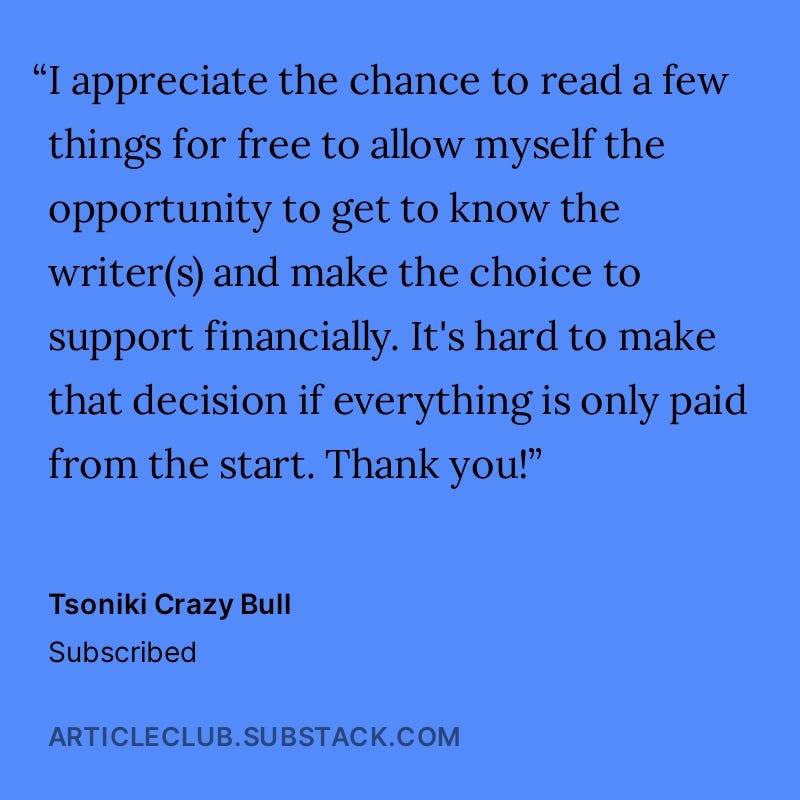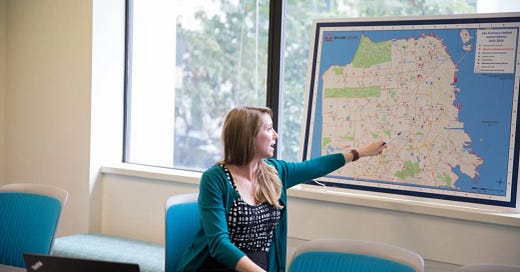#436: Peddling Public School
Also: Learning to ride a bike, struggling to read, and answering loaded questions
Happy Spring, loyal readers! My hope is that you’re enjoying the extra daylight and finding some time to read out in the sun.
Sound like you? If so, I have some great articles for your consideration. Unlike two weeks ago, when the pickings were slim, this time I had no trouble finding plenty of outstanding pieces. (And there’s more to come. Hint: Nikole Hannah-Jones.)
This week’s issue is a classic version of Article Club: four great selections from a variety of publications, exploring issues of race, education, and culture. Choose from:
what public schools have to do to fend off declining enrollment
what a man with OCD has to do to process what he reads
what a 32-year-old man has to do to learn how to ride a bike and drive a car
what people have to do to stay sane when asked loaded questions
If you’re a diehard subscriber, I challenge you to carve out two hours so you can take in all four selections (then tell me if you do).
🙋🏽 It’s time for you to tell me things!
If you’ve been following the newsletter over the last month, you’ve been sharing your thoughts and ideas about the future direction of Article Club. Thank you for doing so! (The polls have been popular.) Here’s this week’s question:
⭐️ Thank you for voting! Now let’s get to this week’s selections.
1️⃣ Peddling Public School
Traditional public schools are in a bit of trouble. Between the pandemic, private schools, charter schools, virtual schools, homeschooling, unschooling, and school refusal, does your neighborhood school stand a chance?
Of course, says Lauren Koehler, the executive director of San Francisco Unified School District’s Enrollment Center. Public schools face a bad rap, and it’s her job to convince leery families that their child will get an excellent education in SFUSD.
This is a task easier said than done. There’s plenty standing in the way, like:
Decades of racism, white flight, and failed attempts to desegregate
A bewildering lottery system that determines where students go to school
We love reading stories about failed schools, so the press keeps publishing them
White parents want diversity but don’t want their kid learning next to a Black kid
I found this article illuminating because it combines an historical look at enrollment issues in San Francisco, while also featuring Ms. Koehler and what her office is doing right now, on a daily basis, to keep the school system solvent.
By Gail Cornwall • The Hechinger Report • 22 min
2️⃣ Illiterati
For as wonderful reading can be, for many of us, it’s a slog. After all, as Prof. Maryanne Wolf reminds us, reading is not a natural act. Over my many years as an English teacher and literacy coach, I’ve come to understand the complexities of decoding and comprehending text. But this well-written essay humbled me and introduced me to a new perspective. You see, Luke Reiter deeply struggles with reading. But it’s not because of the typical reasons. It’s because the letterforms trigger his obsessive-compulsive disorder. In particular, Ks — with their acute angles, serifs, and sharp chevrons — are difficult for Mr. Reiter to “clear.” If he doesn’t clear a K, Mr. Reiter has to perform a “ritual,” which must be completed perfectly, or else done again (and again). It sounds horrible. But for Mr. Reiter, it’s not. No matter the struggle, no matter how long it takes to get through a text, the act of reading is beautiful. He writes:
In literature, I found the strictures of my mind could be outmatched by the boundless possibilities in words. It was arduous but essential — a slippery lifeline. At times—not always, but on occasion—the prickly shapes on the page would melt down, alchemize into something transcendent, and I was delivered from myself.
I highly recommend this article, especially if you’re an educator, parent, or someone (like me sometimes) who has their taken reading life for granted.
By Luke Reiter • Hippocampus Magazine • 10 mins

3️⃣ Stumbling Can Be Lovely
When’s the last time you learned something new? Where you were a total beginner? Devin Kelly explores these questions in this fantastic essay, in which he reflects on learning to ride a bike and drive a car — at age 32.
As adults, Mr. Kelly writes, “we pretend at certainty all of the time, even in the stumbling that life almost always is.” Learning as an adult is fraught with fear and shame. But childhood learning is different. Mr. Kelly wishes he could summon the permission of childhood to frolic in his failures. He writes:
[There is] the strangely wide and luminous space allotted to children, that whimsical and imaginative place where scrapes can be kissed away and where the letter A resembles aardvarks and where what is broken can be fixed, even forgotten. As a child, you fly down the hill that once sent you crashing. The number for poison control is on the fridge. You don’t grow up until you have to.
This is Mr. Kelly’s third essay featured in this newsletter. His last, “Children in the Garden,” was selected Article of the Month in April 2022.
By Devin Kelly • Longreads • 21 mins
4️⃣ The Question Trap
One thing I don’t like in life is when people ask me a question they already think they know the answer to. Even worse is when the questions are filled with criticism and judgment, awkwardly disguised as innocuous. (“Have you thought about approaching this in a different way?” is one of my least favorites.) This episode of This American Life features five loaded questions that are “wolves in sheep’s clothing.” They are:
“Which one of you is handy?” (to a gay male couple)
“What do you think of Beyoncé?” (on a first date)
“How old are your kids?” (when one has died)
“How’s your mom?” (when she has dementia)
“Can I help you?” (as a tutor)
It’s rare that I love every single “act” of a This American Life episode. This is one such episode. I hope you’ll take a listen to the whole thing (and share what you thought).
This American Life • 58 mins • Apple Podcasts • Transcript
Thank you for reading this week’s issue. Hope you liked it. 😀
To our new subscribers Mindy and Jimmy, I hope you find the newsletter a solid addition to your email inbox. Welcome to Article Club! Please make yourself at home.
Lately I’ve been asking subscribers what they like most about Article Club. Loyal reader Jenny said, “Hands down, it’s the quality of the articles.” I was happy to hear that, especially because the whole point of this newsletter is to bring you the best on race, education, and culture. This means reading a ton of articles and rejecting many well-written pieces that don’t quite make the cut. (For example: this one on classical education and this one on the black box of race.) My hope is that Article Club saves you time scouring the Internet searching for good things to read. And my hope is that at least one article from time to time helps you pause for a bit, nudge you to reflect, and urge you to think about the bigger things in life.
If you appreciate the articles I choose and the blurbs I write, it’d make me very happy if you shared Article Club with a friend or bought a paid subscription.
On the other hand, if you no longer want to receive this newsletter, please feel free to unsubscribe below. See you next Thursday at 9:10 am PT.







I read all the articles in one sitting! I wrote a comment after reading "Struggling to read", but I do not know where it went. 😒😂 The "Peddling Public School" article was heart- breaking! What will happen to the education of our young people, especially the "ones at risk or are underprivileged"? I have copied off some of the writing of: "Learning to Ride a Bike" because the comments were so wise.
Thanks for sharing the SF public school article. That's where I have relatives with a toddler and I had a debate with them and some of their friends about whether avoiding public school is the answer (I'm pro-public). In any case, I sent them this article and will read more myself so I can better understand where they might've been coming from.